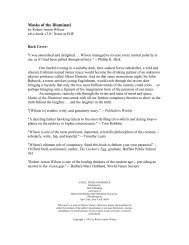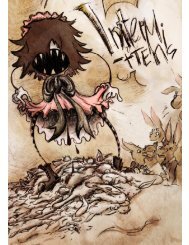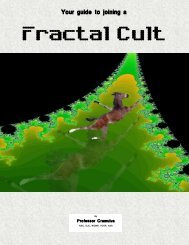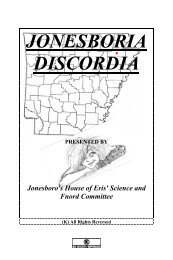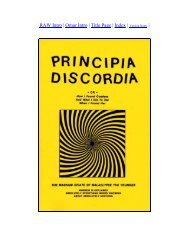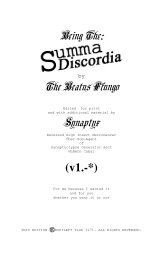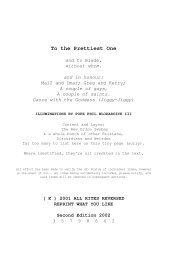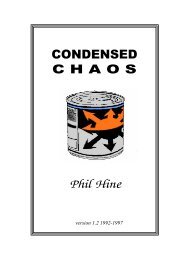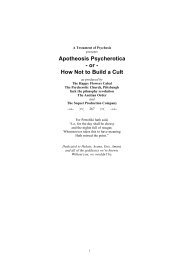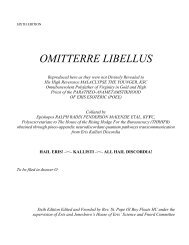Coincidance - Principia Discordia
Coincidance - Principia Discordia
Coincidance - Principia Discordia
You also want an ePaper? Increase the reach of your titles
YUMPU automatically turns print PDFs into web optimized ePapers that Google loves.
60 COINCIDANCE<br />
power, with an outcry of desire, to make the missing mother mysteriously<br />
appear again and offer the all-providing breast. It is no accident, then, that so<br />
many poems, from the Odyssey right up to Joyce's great prose-poem, Finnegans<br />
Wake, contain magical "invocations" summoning the goddess to appear at once.<br />
We can now see that there might have been more than a joke in the<br />
famous exploit of Eleanor's father, Guillaume of Aquitaine, who built a<br />
private brothel or harem on his land in the exact architectural style of<br />
contemporary convents. The "convents" of the old matriarchal religions, of<br />
course, had been devoted to what is alternately called hierogamy or sacred<br />
prostitution or sex magic; perhaps Guillaume had been consciously trying to<br />
revive that. And when Eleanor herself rode through Jerusalem with bared<br />
breasts, she also may have been prompted by more than high spirits. It is<br />
traditional in many schools of initiation to require some such public act,<br />
which is thought to have magical significance and also separates one sharply<br />
from the obedient servants of the existing establishment, parading those<br />
emblems of matriarchal fertility-worship through the Holy Land of the<br />
world's three strongest patriarchal religions—Judaism, Christianity and<br />
Islam—may have been an act of fealty to the old mother goddess and an<br />
invocation attempting to restore her worship.<br />
If so, it has only been partially successful. . . thus far.<br />
The taboo on showing the breast is certainly odd if one considers it in relation<br />
to the attractive features of other animals. One does not read of peacocks who<br />
are ashamed of their gorgeous tail-feathers, of goldfish hiding their lovely fieryyellow<br />
markings, of lionesses having squeamish feelings about their brutal<br />
beauty. Yet a woman of today (unless she is a professional topless dancer) might<br />
still go through the processes which the psychologist Flugel described in 1930:<br />
A woman may, for example, refrain from going to a dance in a very<br />
decollete dress: (a) Because, although she thinks it becomes her and she<br />
experiences a real gratification at the sight and feeling of her bare upper<br />
body, she yet experiences a sense of shame and embarrassment at the mere<br />
fact that she should do so. The modest impulse is here directed against<br />
desire....(b) Because, although she experiences none of the scruples just<br />
mentioned and freely enjoys the sight of herself in her mirror, she yet fears<br />
that she may unduly stimulate sexual desire in per prospective partners; in<br />
this case the modesty is still directed against desire, but now refers to<br />
feelings in others rather than to feelings in the self, (c) Because, on putting<br />
on the dress, she is immediately overcome by a feeling of revulsion at her<br />
own image. .. . Modesty here works against disgust aroused in her own<br />
mind. . . . (d) Because, although she may be pleased at the effect of the<br />
low-cut dress, she thinks of the shock that her appearance in it will cause to<br />
certain puritanically minded friends. ... In this case, modesty is directed<br />
against disgust ... in others rather than feelings in herself.*<br />
*].C. Flugel, The Psychology of Clothes (New York: International Universities Press, 1930)




